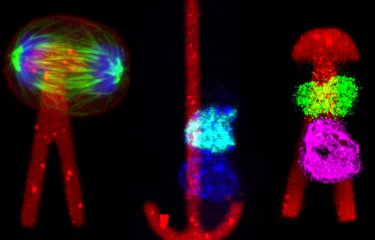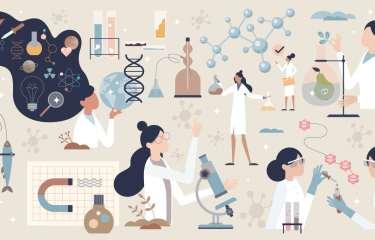Several prokaryotic microbes (bacteria, archaea and their viruses) are known to cause diseases, but these microorganisms also provide invaluable models for exploring the mechanisms of living systems. In the Department of Microbiology, scientists study how they interact with their environment and, depending on the type, prevent or trigger infection. Our research seeks to elucidate and understand the adaptation strategies, antibiotic resistance, and virulence and evasion mechanisms at play in the immune system. Using our wide-ranging expertise, this research helps improve our understanding of the prokaryotic world and paves the way for novel discoveries, therapies and diagnostic tools.
Our main recent publications
Off-target effects of Cas9 on bacterial gene expression
Powerful genetic manipulation tools derived from the CRISPR-Cas9 system can be used to modify gene expression. Gene specificity represents a key challenge, since so-called off-target effects can lead to non-specific effects, skewing the interpretation of experimental results. This study conducted on bacteria revealed an unexpected effect: Cas9 can block gene expression unpredictably by binding non-specifically upstream of genes.
Nucleic Acid Research, April 24, 2023.
How the respiratory tract microbiome influences the severity of bacterial pneumonia
Scientists analyzed the inter-kingdom (bacteria, archaea, fungi, protozoa) diversity and composition of the respiratory tract microbiome (RTM) of patients with pneumonia due to Legionella pneumophila. After antibiotic treatment, the empty RTM niche is rapidly occupied by other bacteria. Thus, high biomass emerges as a biomarker for secondary/co-infections. The interplay of RTM equilibrium, pathogen load dynamics, and clinical interventions play a critical role in the recovery of pneumonia patients.
Cell Reports Medicine, September 19, 2023.
A bridge for phospholipid traffic
Understanding how bacteria build and maintain their cell envelope is a major area of investigation in the fight against pathogens. However, current knowledge is mostly based on a handful of models. Using the diderm Firmicute V. parvula, scientists have identified a novel mechanism responsible for phospholipid trafficking that forms a trans-envelope bridge between the inner and outer membrane and is widely distributed in Gram-negative bacteria.
Nature Communications, November 23, 2023.
Discovery of a family of bacterial defense systems
A defense system was discovered in Escherichia coli bacteria by a PhD student and his supervisor Isabelle Rosinski-Chupin. In this system, the bacteria eliminate a DNA molecule carrying an antibiotic resistance gene, or plasmid, but not before the resistance gene has been integrated into the bacterial chromosome. In defending themselves, the bacteria establish antibiotic resistance. This discovery is a step towards improving understanding of the spread of antibiotic resistance, a major public health challenge.
Nature communications, May 15, 2024.
Viral RNA neutralizes bacterial defenses
Phages are viruses infecting bacteria that defend themselves with immune systems such as PARIS. This system prevents the phage from producing its proteins by destroying a bacterial transfer RNA. But some phages outmaneuver this defense by producing a modified version of the RNA, enabling them to establish infection anyway.
Nature, August 7, 2024.





